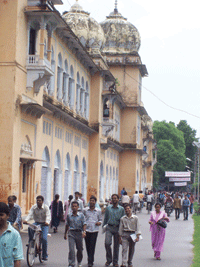A financial crisis is brewing in Lucknow University (estb.1920), where plans to hike the university’s rock bottom tuition fees have begun to draw protests from students. At a meeting chaired by LU’s vice-chancellor Ajaib Singh Brar on December 10, a resolution was passed to raise tuition fees (unchanged since 1995) levied upon students enrolled in regular and self financing courses (SFCs).
The rock bottom tuition charged for regular courses was doubled while for self financed business management courses it was raised by 50 percent, and for the other SFCs by 20-30 percent. The passage of the resolution translates into mainstream (e.g. BA, B.Com) tuition fees rising to Rs.2,000-5,000 per year (Rs.166-415 per month) from the Rs.1,000-2,000 (Rs.83-208) currently payable. However for the SFCs, the fee would jump from Rs.2,000-13,000 to Rs.4,000-26,000 per semester.
 Announcing this tuition fees hike (which will raise an additional Rs. 9 crore per year), Brar said that it was unavoidable given that the state government has frozen LU’s annual grant since 1998 at Rs.16 crore per year. “We have done our level best not to pass the entire burden to students, and have requested the state government to support the university,” says Brar.
Announcing this tuition fees hike (which will raise an additional Rs. 9 crore per year), Brar said that it was unavoidable given that the state government has frozen LU’s annual grant since 1998 at Rs.16 crore per year. “We have done our level best not to pass the entire burden to students, and have requested the state government to support the university,” says Brar.
LU’s financial crisis goes back to 1998 when despite the Fifth Pay Commission mandating a 12 percent increase in faculty remuneration, the state government refused to increase the Rs.16 crore annual grant it gives to the university. Simultaneously a modest tuition fee increase was withdrawn by the government which asked the university to start generating its own funds. LU then began offering SFCs of questionable quality. Today the university offers almost 100 SFCs conducted by visiting faculty and guest lecturers.
Student protests began as soon as the higher tuition fees were announced, with students questioning whether higher fees would improve academic standards. Ironically, the fee hike resolution was taken after the state government accepted the Sixth Pay Commission (SPC) recommendations which propose an average 15 percent increase in faculty remuneration. Currently LU pays out Rs.36 crore annually towards faculty remuneration, a sum which will rise to Rs.66 crore per year following the SPC pay hike recommendation.
Comments Lucknow University Teachers Association president Anil Shukla: “The aggregate amount raised by the proposed fees increase is pathetically inadequate. Soon there will be no option but to shut down the university. How do we run the university if government grants are static while expenses double? If the university can be closed sine die because of law and order problems, why not for a financial crisis that is so severe?”
Adds Shailendra Kumar, a first year management student: “The placement situation is bad; the faculty is jaded. If the tuition fees for the university’s questionable quality SFCs are raised so sharply, there won’t be any takers.”
These apprehensions are justified. While 60 percent of the funds generated through SFCs should be allocated towards enhancing their quality, in reality 70 percent are absorbed by faculty remuneration. Moreover there are only 400 teachers for LU’s 36,000 students, resulting in a teacher-student ratio of 1:90 against the norm of 1:60. Often one teacher is obliged to supervise half a dozen research scholars leading to dubious quality research output. Little wonder no research paper from the university has been accepted by any reputed international journal during the past three decades.
Inevitably this 88-year-old university’s problems are not merely financial, they are rooted in the beggar-thy-neighbour politics for which Uttar Pradesh and the Hindi heartland states are infamous. For instance, although University Grants Commission sanctioned 110 teaching posts for LU in the Ninth Plan (1995-2000), not a single new appointment has been made due to prolonged differences of opinion between the state government and the university authorities. Moreover, nepotism in faculty appointments is rife, and LU has minimal interaction with other institutions of excellence. And populist politics has ruined the university’s balance sheet. For instance, some 8,000 other backward castes (OBCs) students don’t pay any tuition fees at all, and the Rs.6 crore the university loses annually is seldom reimbursed on time. Teacher absenteeism is a chronic complaint while classrooms are bare of ICT and audio visual learning equipment.
Now as student protests against the proposed fee hikes begin to gather momentum, there’s every possibility that the proposal will be nixed by the state’s Bahujan Samaj Party-led government, which fears losing support of the student community in the forthcoming Lok Sabha election. Which is just as well, because the Rs.9 crore per year that the LU management proposes to raise through the fee hike proposal is little more than tokenism.
Vidya Pandit (Lucknow)